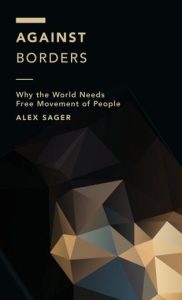In Against Borders: Why the World Needs Free Movement of People, Alex Sager makes a timely and thoughtful case for a borderless world, grounded in the principles of freedom and equality. The book offers a compelling argument against borders as a means of unjustified exclusion, writes Marco Bitschnau, and is recommended to all those who have long questioned borders and their supposed indispensability.
Against Borders: Why the World Needs Free Movement of People. Alex Sager. Rowman & Littlefield. 2020.
 There is a certain kind of irony in reviewing a book titled Against Borders: Why the World Needs Free Movement of People in the midst of a global pandemic that has seen the free movement of millions restricted to a degree rarely seen in modern times. And yet, COVID-19 and its various repercussions aside, Alex Sager’s thoughtful case for a world without borders and boundaries has perhaps never been as timely as now.
There is a certain kind of irony in reviewing a book titled Against Borders: Why the World Needs Free Movement of People in the midst of a global pandemic that has seen the free movement of millions restricted to a degree rarely seen in modern times. And yet, COVID-19 and its various repercussions aside, Alex Sager’s thoughtful case for a world without borders and boundaries has perhaps never been as timely as now.
Ever since the publication of Joseph H. Carens’s Aliens and Citizens (1987), the question of whether states should have the right to unilaterally restrict access to their territory has been a recurring theme in both political philosophy and migration studies. For Sager, the discussion is all too often dismissed out of hand. Drawing on the insight that ‘radical change is possible’ (5), his slender book (less than 140 pages in length) seeks to cast new light on the issue and presents cogent arguments in support of a borderless world.
Sager opens the first chapter by discussing the scope of his reasoning, ultimately making a categorical distinction between his advocacy of open borders and contrastive no borders positions: while the former is about abolishing a specific function of borders – namely, the production and maintenance of regimes of illegality – the latter seeks to dismantle borders and statehood in their entirety. ‘To support open borders is to deny that the use of state coercion to restrict immigration into state territories is ethical’ (12); it is not to postulate that the principle of state jurisdiction is wrong in itself. The book’s own title, Against Borders, is perhaps a little misleading in this regard.
This terminological excursion helps readers to understand the two lines of argument presented in the second and third chapters, the first of which is rooted in the principle of freedom. By means of immigration laws, this freedom is violently taken away by the state and hundreds of millions are denied access to opportunities many of us take for granted. Consequently, Sager turns the burden of proof on its head: opponents of open borders are the ones who should provide justification for such invasive measures. Yet respective efforts by David Miller (2010) and James Griffin (2001) cannot convince him; while the former argues that immigration control measures are not really coercive, the latter holds that they do not violate human rights as long as there is a range of alternative options available to immigrants. Both Sager regards as inconsistent.

The second argument builds on the principle of equality and refers to Carens, who had once famously compared the social ramifications of immigration laws to feudalism. Also citing J. K. Galbraith’s dictum that migration is the oldest action against poverty, Sager condemns birthright privilege and restrictions that prevent people from breaking the cycle of exploitation and inequality. Any honest commitment to distributive justice, he expounds, does necessitate fully open borders and not only more open ones. On that note, he also rejects the idea that affluent societies are not obliged to literally tear down their walls, but merely to share some of their wealth with the less fortunate: development aid instead of free movement for all. He finds this position simplistic, disregarding of people’s preferences and, in its dichotomy, based on the erroneous assumption that both options are mutually exclusive rather than complementary.
While freedom and equality are his main arguments, Sager adds yet another point in the fourth chapter by invoking the inherent violence of border controls. Outlining the devastating effects that these practices have on immigrants and their communities, he contends that incremental reformism, even in its most benevolent form, fails to address the real core of the problem: the coercive exclusion of those marked as strangers and the immense human suffering it entails. Because the ‘logic of immigration enforcement limits the possibility of fundamental reform’ (59), it makes the end of injustice directly dependent upon the dissolution of the structures that continuously reproduce it – border regimes.
The purpose of the subsequent two chapters is to defend these arguments against a number of objections. Sager begins with the most obvious one, self-determination, where he disputes the position that a national community should be entitled to limit immigration by virtue of its freedom of association: the right to exercise full discretion on all matters of membership (similar to a club). This position may be popular, he admits, but raises plenty of questions. Why should the state’s position be privileged, for instance? Why should it take precedence over the freedom of association of transnational families and similar groups? And even if we were to accept the rather odd analogy between the state and a club, why should the many have to suffer simply because the few are unwilling to associate with them? Would it not be a more logical solution that the unwilling members leave instead?
Equally problematic is the postulate of associative ownership, according to which individual contributions to the maintenance of state institutions lead to collective ownership rights. If this position is taken seriously, then exclusion is even harder to justify ‘as illegalized immigrants and some people outside of the state’ (62) also pay taxes and contribute to the public good. Sager also rejects claims that open borders would jeopardise public safety or exacerbate environmental degradation, as there is no reliable empirical data from which to derive such assumptions, to say nothing of the ethical obscenity of demanding that the poor ought to ‘remain in poverty to protect the environment’ (72). Quite similar is his response to cultural and welfare-based concerns, where he points again to a gaping lack of evidence that would establish a clear link between immigration and lower social trust or higher welfare expenditures. Instead, he highlights the illiberal kernel of the belief that (monolithically understood) culture is the main or even only determinant of immigrant agency.
In the last chapter, one would expect a summary followed by some concluding remarks. Yet Sager goes a step beyond and links his critique to an ethical imperative for anyone in whose name the exclusion of immigrants takes place. Confining oneself solely to the passive support of open borders is not enough, he writes, for we are ‘at a juncture in which we are forced to choose between openness and closeness’ [sic] (102). With nationalist sentiment on the rise (be it in the form of right-wing nativism or disguised as left-wing nation-state centrism) and calls for isolationism growing louder, taking a stand and protesting the injustices of immigration laws, barbed wire fences and visa privileges should be regarded as nothing less than a moral duty. A duty that becomes more difficult to evade with each passing day.
Weaving together different strands of political philosophy and turning the conclusion – denying migrants access is morally reprehensible – into a call for political engagement, Against Borders is a well-reasoned and lucid work that, albeit a little too focused on the US at times, offers a compelling case against borders as a means of unjustified exclusion. While much of its core message can also be found in Andreas Cassee’s earlier Globale Bewegungsfreiheit: Ein philosophisches Plädoyer für offene Grenzen [Global Freedom of Movement: A Philosophical Plea for Open Borders] (2016), Sager’s clear stance, his persuasiveness and holistic view make this book definitely worth reading. It can be recommended to scholars and students looking for an extensive collection of arguments in favour of unrestricted movement – but also to all those who have long been sceptical of borders and their supposed indispensability.
Note: This review gives the views of the author, and not the position of the LSE Review of Books blog, or of the London School of Economics.
Image Credit: Photo by Kyle Glenn on Unsplash.







